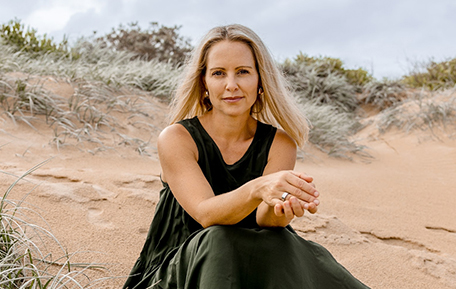Surviving the Bondi Swindler: Lessons from a conman’s last victim

Tracy Hall was conned out of her life savings by her then-boyfriend Hamish McLaren. (Supplied)
For Tracy Hall, the story began like many modern romances. A chance encounter on a dating app, a connection that seemed genuine, and the promise of a new chapter in life. But this wasn't a fairytale—this was a nightmare that would cost Hall almost everything, including her trust, her savings, even her sense of self.
It was a Tuesday morning in July, 2017 and Hall was becoming increasingly worried about her boyfriend, Max Tavita. She hadn’t heard from him in over 24 hours, which was unusual given their regular contact. Desperate for answers, Hall called Bondi Police.
Soon after, Hall saw a Crimestoppers segment on TV featuring a man she recognised as Max, but under a different name. What she discovered in the days after would bring her world crashing down.
Max wasn’t who he claimed to be. The man Hall had shared her life with for almost 18 months, a Bondi-based investment executive and hobby surfer, was actually Hamish McLaren - a serial conman, now the subject of the popular Who the Hell is Hamish? podcast.
A master manipulator who had defrauded 15 victims out of $7.6 million via fake investment schemes, Hall was his last victim. By the time McLaren was arrested, he had stolen her life savings under the guise of funnelling them into investments— she lost $317,000. Yet, despite the financial and psychological devastation of the investment and romance scam, her spirit remained unbroken.
Now an advocate for scam victims and author of The Last Victim, Hall is sharing her story to help others understand the psychological and financial impact of romance and investment scams.

Hall shared the full story of the relationship in the hit podcast Who The Hell Is Hamish? and in her book The Last Victim. (Supplied)
From Deception to Reflection: Finding Humour in the Pain
Hall’s experience with Hamish McLaren was not just about money. She admits being vulnerable at the time - smart, successful, but struggling as a single mother balancing work and parenting. McLaren, knowing exactly how to exploit her weaknesses, presented himself as the perfect partner: charming, empathetic, and willing to “help” her with her finances. It was all part of his strategy to prey on her vulnerabilities.
For the first year after his arrest, the weight of the betrayal was overwhelming. But eventually, Hall found a way to process the trauma, injecting humour into her painful narrative when writing her book.
"It took me a long time to see the funny side of things," Hall admits. "In the first year, I was in a shame hole, depressed, anxious… But I have an optimistic outlook, a positivity bias. That’s the way I look at life – if you don’t laugh, you’ll cry. You have to see the light at the end of the tunnel.”
Her resilience is evident. Having already faced hardship before meeting McLaren, Hall was no stranger to adversity. But nothing had prepared her for the level of psychological manipulation and financial destruction that came with this scam.
Reclaiming Financial Control
One of the biggest lessons Hall learned was the importance of financial literacy and ownership. After losing nearly everything to McLaren, at 42 she was forced to rebuild her finances from the ground up. Her attitude towards money—and the power it holds—shifted fundamentally.
"If we're not taking extreme ownership of our financial security, we are very vulnerable," Hall reflects. "Especially as women, because money gives us security and choice. And choices are important."
Before the scam, Hall had outsourced her financial decisions and trusted McLaren to take the reins. In hindsight, she sees this as a critical mistake. Now, she’s fully engaged with her financial wellbeing, proactively educates herself about money management, and has even enlisted a female financial advisor who has helped her regain control.
"I make sure I understand everything now. If I don't, I ask questions. I don't just hand things off to someone else," Hall says. "I budget, I save, I do Cash Rewards and Airbnb my apartment. I'm doing everything I can to claw back the money I lost—and I’m not ashamed of it. It’s about agency. And I won’t ever give that up again."
For Hall, financial independence isn't just about dollars and cents; it's about security and freedom. She is now focused on building a future for herself and her daughter, one where they are both safe, secure, and in control.
The single mum fell in love with 'Max Tavita' aka Hamish McLaren over an 18 month relationship. (Supplied)
Psychological toll
While losing a significant sum of money is devastating, Hall says that the emotional and psychological toll of being scammed is even more profound. The shame that follows such an experience can isolate victims, making it hard to talk about the betrayal or seek support.
“I’ve learned a lot about shame,” Hall says. "It’s a lonely emotion. It festers in the dark. You feel like it’s your fault because you believed someone, and you did things that, looking back, seem foolish. The truth is, it wasn’t your fault. I was manipulated.
"Trusting other people isn’t as hard as trusting myself again. I made the biggest mistake of my life and rebuilding that trust has been the hardest part of my journey. It’s something I still work on every day."
Hall encourages others who have fallen victim to scams to focus on healing—not just financially, but mentally and emotionally.
"If you can afford it, talk to someone. Mindset is everything. Don’t let the shame and isolation consume you. It’s important to acknowledge that you are a victim of crime. It's not your fault."
The red flags missed
Looking back, Hall can see the red flags that she missed at the time.
Among the most glaring was McLaren’s reluctance to introduce her to family and friends. “If you’re in your 40s and haven’t met someone’s friends and family within the first few months, that’s a massive red flag,” she says. He had no digital presence—no social media, no online footprint, which Hall now understands was highly unusual.
The most telling sign, however, was the fantastical nature of McLaren’s stories. They seemed too far-fetched to be true—yet over time, she came to accept them. "This is how manipulation works. It creeps in, little by little, and you start to believe it. It’s like grooming. You don’t realise you’re being moulded until it’s too late."
In hindsight, Hall also points to McLaren's ability to "shape-shift" and become whoever she needed him to be. “He just created himself to be someone that I would fall in love with. And he did that with everybody.”
Now, Hall is an advocate and author helping othes by sharing her lessons learned. (Supplied)
Protecting yourself from scammers
Hall’s experience is a stark reminder of how cunning and dangerous scammers can be. But it’s also a story of hope and strength—proof that it’s possible to recover and rebuild after being deceived. Her advice to others? Stay vigilant, trust your instincts, and take ownership of your finances.
"I will never, ever give up my financial agency again. I’ve learned that the hard way. And I will teach my daughter the importance of money, choice, and security, so she never has to go through what I did."
In addition to her book, Tracy Hall has a range of resources available on her website, including her top tips to avoid investment, targeting and dating scams.


